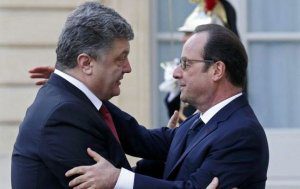
KYIV. April 23 (Interfax-Ukraine) – Ukrainian President Petro Poroshenko and his French counterpart Francois Hollande have discussed bilateral cooperation in privatizing Ukrainian companies.
During their meeting in Paris on Wednesday, both presidents agreed to facilitate cooperation in privatization, the Ukrainian presidential press service has reported.
“We will use the expertise of the French bureau for the organization of the most transparent privatization in the history of Ukraine,” Poroshenko said.
The parties also discussed the participation of French investors in the privatization of large facilities in Ukraine.
“The presence of powerful French investors in Ukraine will only contribute to the strengthening of our reforms,” Poroshenko said.
France is also willing to share its experience in banking supervision, customs control, administration of public enterprises, as well as privatization, according to the press service.
Hollande in particular expressed his country’s interest in developing closer relations in the agro-industrial sector and in university education. He also announced that a French school would be in Ukraine.
The two presidents emphasized the importance of enhancing bilateral trade and economic relations, particularly in energy, transport, agricultural and food industry, environmental protection and tourism.
“We have signed a joint declaration and outlined a great volume of work that is to be done in various spheres. It is related to the modernization of economy and energy sphere, international financial support and certain projects that will lead to economic growth of Ukraine,” Hollande said.
Poroshenko and Hollande agreed on the training of specialists and the exchange of experience. The deadline for arrangements to enter their first phase of implementation is May 13.
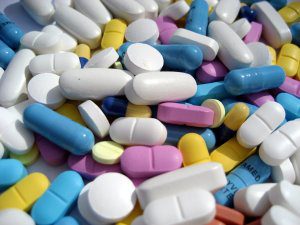
KYIV. April 22 (Interfax-Ukraine) – Retail sales of “pharmacy basket” goods in monetary terms grew by 22.7% in the hryvnia equivalent in January-March 2015 year-over-year, to UAH 12.729 billion, and fell in packages by 19%, to 417.7 packages, Apteka publication has reported, quoting data provided by Proxima Research.
The company said that pharmacy sales of drugs totaled UAH 10.878 billion in Q1 2015, which was 22.9% up year-over-year, and a total of 274.9 million packages were sold (17.4% down).
Sales of medical products grew by 25% in monetary terms, to UAH 984 million, while they fell by 22.1% in packages, to 120.6 million.
Cosmetics sales grew by 3.5%, to UAH 451.7 million and fell by 22.1% in packages, to 11.9 million.
The average price of one package of an item of “pharmacy basket” goods in January-March 2015 totaled UAH 30.50, which is 51.5% up year-over-year, and the average price of one package of dietary supplements was UAH 39.90, drugs – UAH 39.60, cosmetics – UAH 38.10 and medical products – UAH 8.10.
The company said that in Q1 2015 the average price of one package of imported drugs was UAH 99.70, and the average price for one package of Ukrainian-made drugs was UAH 20.30.
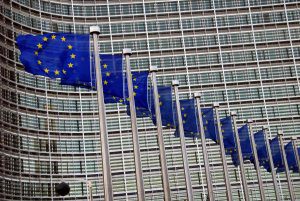
KYIV. April 22 (Interfax-Ukraine) – The European Commission has disbursed a loan of EUR 250 million to Ukraine, which is the last disbursement under the first macro-financial assistance (MFA) for Ukraine, which totals EUR 610 million and was approved in 2014.
“Our assistance helps to address Ukraine’s urgent financing needs and will underpin its structural reform agenda. These reforms are essential in order to stabilize the Ukrainian economy and create the conditions for sustainable growth for all Ukrainians,” the European Commission’s press service quoted European Commissioner for Economic and Financial Affairs, Taxation and Customs Pierre Moscovici as saying.
The European Commission raised the funding for this tranche disbursement on financial markets by a private placement on April 14, 2015. This was achieved through the issue of a EUR 260 million amortizing bond with a final maturity of 15 years, a 10-year grace period and a yield of 0.519%. Of these funds, EUR 250 million was lent on to Ukraine on Tuesday on effectively the same terms, offering a long maturity at a very attractive interest rate, the European Commission said.
Prior to today’s payment, the commission had made two disbursements under this first MFA operation: EUR 100 million on May 20, 2014 and EUR 260 million on November 12, 2014.
The second MFA program for Ukraine, which totals EUR 1 billion, was also disbursed in 2014: a first disbursement of EUR 500 million took place on June 17, 2014, and the second tranche was paid on December 3, 2014.
A third MFA program worth EUR 1.8 billion was approved by the European Parliament and the Council on April 15, 2015. It will be implemented as soon as agreement has been reached between the EU and Ukraine on a Memorandum of Understanding specifying the policy programme accompanying the assistance. The Commission aims to be able to make the first disbursement of this new MFA operation around mid-2015.
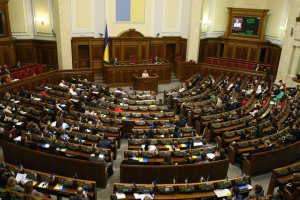
KYIV. April 22 (Interfax-Ukraine) – Ukraine’s Verkhovna Rada has ratified a loan agreement between Ukraine and the European Investment Bank (EIB) on lending EUR 200 million to Ukraine under the Early Recovery Framework Loan (Ukraine) programme.
A total of 263 MPs voted for the ratification on Wednesday.
A draft bill on the ratification of the agreement was tabled by Ukrainian President Petro Poroshenko in parliament on April 10.
As reported, Ukrainian Prime Minister Arseniy Yatseniuk and EIB Vice President Laszlo Baranyay on December 22, 2014 signed an agreement on lending EUR 200 million to Ukraine under the Early Recovery Framework Loan (Ukraine) programme.
The EIB board approved the project on December 16, while the Ukrainian government endorsed it on December 19.
The objective of the loan, which is raised by the Ukrainian government, is to address short-term needs in affected areas controlled by the government of Ukraine, and basic infrastructure needs to shelter internally displaced people in other regions of Ukraine, the EIB said.
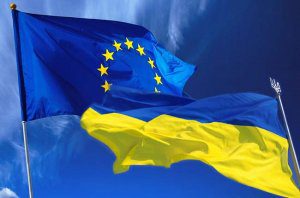
KYIV. April 22 (Interfax-Ukraine) – The Association Agreement between Ukraine and the EU has been fully ratified by 14 states, Ukrainian Foreign Ministry spokesman Yevhen Perebyinis has said.
At a briefing in Kyiv on Tuesday, he named these countries: Bulgaria, Great Britain, Denmark, Estonia, Ireland, Latvia, Lithuania, Malta, Poland, Romania, Slovakia, Hungary, Croatia and Sweden.
The agreement was ratified by the parliaments and submitted to head of state for signature in Luxembourg, Finland and Spain. In Germany, Czech Republic and the Netherlands the agreement was ratified by one of the houses of parliament. In Austria, Belgium, Greece, Italy, Cyprus, Portugal, Slovenia and France the preparations for the ratification continue.
“We are grateful to those states which have ratified the agreement, and hope that the rest of the EU member states will speed up the ratification of the agreement in order to complete the entire process in 2015,” the Foreign Ministry spokesman said.
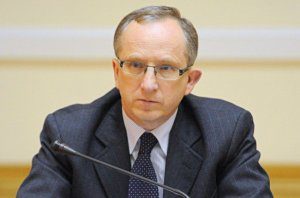
KYIV. April 22 (Interfax-Ukraine) – The European Union isn’t considering any further postponement or review of the implementation of a deep and comprehensive free trade area agreement with Ukraine (DCFTA), Head of the EU Delegation to Ukraine Jan Tombinski has said.
Speaking to Interfax-Ukraine on the results of trilateral talks between Ukraine, the EU and Russia, he said that the European Commission is ready to consider Russia’s concerns in detail and try to find a solution regarding these aspects within the framework of the flexible, deep and comprehensive free trade area agreement. However, neither the further postponement of the implementation of the DCFTA nor the review of the DCFTA agreement is on the agenda, he said.
The trilateral technical negotiations were held over the past two days, Tombinski said. The purpose of the negotiations was to discuss answers to Russian concerns about the DCFTA, which was part of the EU-Ukraine Association Agreement. The sides presented their viewpoints and reached an understanding on some issues, he said, adding that certain matters were referred to the political level.
Tombinski said that the European Commission views tripartite negotiations as a form of EU support of the Minsk agreements. The European Commission has always said that it is prepared to do the utmost, including providing political support for the trilateral process, to accelerate the resolution of the Ukrainian conflict, he said.